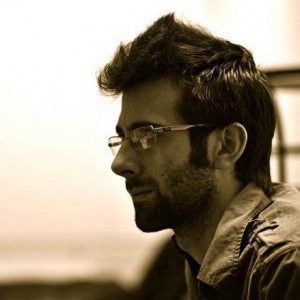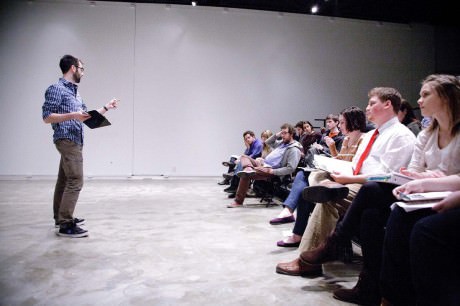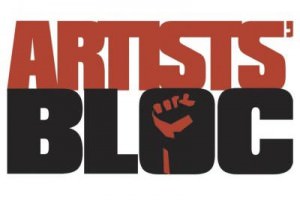On Friday, March 15, 2013 I had the pleasure of watching a reading of the new musical Everything I Do by John Becker. The play is based on a contemporary adaptation of Shaw’s Man and Super Man. The show will be produced for The Capital Fringe Festival this summer. Here are some questions I asked Hunter Styles, Artistic Director of Artists’ Bloc.

Cate: In your mission statement for Artists’ Bloc you state: “It’s time for performing artists to unite in support of one another. It’s time to use our art to create positive change in our community. It’s time to stop being a disparate group working next to each other and become a unit working with each other.” Would you talk about this goal and how you accomplish it in workshops like these?
Hunter: Artists’ Bloc provides a number of services that are pretty unique on this arts scene, but it’s equally important that we work in tandem with the other organizations and resources in town. So that’s why we emphasize working with each other. I see that as a rallying cry. When we founded Artists’ Bloc in 2008 we dedicated ourselves specifically to new work, happening in its very early stages, specifically by DC-area artists. We put our focus on creating opportunities for informed, constructive peer-to-peer feedback. We exist to help the project find its early legs, and to empower the artists who are making it to ask themselves some fundamental questions about why and how they’re making what they’re making. With these events, plus a bunch of happy hour and networking events every year, we do our part to help knit the arts community together. I think the DC arts region shows a firm belief in the power of individuals, small companies, young artists, new projects, mentorship, experimentation… It’s just a matter of getting people in the same room.
How do you select the plays that receive workshops?
My personal taste has no real impact on selecting the projects we decide to workshop. What matters most is that the creator of the work — whether that’s a solo performer, a playwright, a dancer, a designer, etc — has clear goals and active questions about their work that they’re really looking to work through. Those are the artists who benefit the most from the feedback process. They have to be precise in the questions they ask. That way, the responses they get from our dramaturgs, artists, and audiences will pay back with equal precision.
Everything I Do contemporizes Shaw’s text and tells the story through music. In your eyes what is the responsibility to the original work when creating a project like this?
Honestly, I wouldn’t say there’s any particular responsibility. Or rather, that responsibility depends completely on the goals of the artist. If you want to do an adaptation of Shakespeare set in outer space, and that idea gets you passionate and curious, go for it. Not every creative idea rings true for every audience member, but navigating how audiences will feel about your show is not the first order of business. Getting your idea to stand up in the first place in the way you imagine it should takes play, and time, and care. Shaw is difficult text. It’s dense in ways, and the language is heightened… People certainly don’t do musicals based on Shaw plays very often. But John Becker sees a way of capturing some of the themes and emotions of the show through music, and that root confidence he has in the concept is well worth our support through the early forming stages, regardless of the shape it ends up taking.
In feedback sessions for Artists’ Bloc Workshops, you are very adept at guiding the audience comments and supporting your playwrights while allowing participants to share critical feedback. Would you talk a bit about how you find that balance?
Artists’ Bloc uses a method of critique based in part on Liz Lerman’s Critical Response Process. When we do a feedback session we break it up into a few sections that help us keep the creating artist empowered and the audience engaged. Typically we start by having the audience share what they thought worked, what were strong, memorable moments, things like that. Then we give the artist an opportunity to ask questions of the audience, which can help focus feedback toward specific aspects of the showing that the artist wants to talk about. Then comes an opportunity for the audience to ask the artist questions. Finally, since we have some trust built up by this point, we give the audience the chance to share more specific, critical thoughts with the artist. During this, the artist is still the one steering, and they can talk as much or as little about specific aspects of the show as they want. In essence, we want to think of the feedback session as an educational opportunity for the audience. The more they learn why an artist is making particular choices, the better informed they’ll be and the more thought they’ll put into their responses.
What is the process from here? How much involvement in the process do you have after the workshops?
That really depends on the workshop. Sometimes a workshop happens a few months before the piece is being fully produced, in which case it’s easy to keep tabs on the artist’s next steps. Sometimes artists decide to table their work on a project for a while. Either way, we do our best to stay on their radar, and keep them on our radar, and offer brainstorming, resources, follow-up opportunities to do read-throughs and workshops… whatever is most helpful to that particular artist and their thinking about what’s next.
Like most of us, you balance a career in theatre by wearing several different hats. Can you take a moment to explain that balance in reference to the goals of Artists’ Bloc?
It’s true that I have a number of jobs in the theatre. I’m on staff at Signature Theatre. I write reviews for DC Theatre Scene and have been doing some pieces for American Theatre magazine. I’m also a playwright and I frequently direct as well. So, there’s all that. But there’s also a lot that I don’t know, or have very little experience in, and that’s part of what makes the breadth and diversity of Artists’ Bloc programming so fun as well. Artists’ Bloc has a need for experienced artists, dramaturgs, performers, and directors, in the private workshop sessions as well as the public ones, but a fresh set of eyes during public feedback — not just from those who don’t already know the project, but sometimes from those who aren’t regular theatergoers — is incredibly helpful. If we have a rich base of artists for a given event, and then we also make the effort to bring new faces into the room, then we get to have it both ways.
How much involvement do you have directly with re-writes and suggestions for the final Fringe production of Everything I Do?
Well, our spring work on Everything I Do culminated in the March workshop showing. But as a friend and colleague of John Becker, and of director Michael Kelly, the conversation will continue. They’re affiliated with Artists’ Bloc now and it would be great to keep that connection alive. I’ll offer what help I can — we’ve already had one meeting together post-workshop to sync up and get their thoughts on how it went — but in terms of Fringe, this project is very much theirs to bring to fruition.

John Becker did a lovely job of balancing Shaw’s concepts with more contemporary language and music. As a writer yourself, are you better able to guide your playwrights through this process?
As with a lot of vocations, sometimes it seems that the more you learn the less you know. I think over time, writing several plays and reading hundreds, I’m always struck by how personal the process is. Not just the style of the writing, but the lifestyle and the activity of writing… it really differs from person to person. Sure, I have certain concrete thoughts and rules that I keep about clarity of story, character development, plot structure etc., which I’m usually willing to offering during a workshop (or, often, afterward). But there are a million ways to tell a story, and I do my best to help give artists room to breathe while they work things out.
Can you take a moment to tell us about the Fringe Production? Is there anything audiences should look for in this piece?
Some acquaintance, even a passing one, with the Shaw play Man and Superman will probably be helpful. It won’t be required reading beforehand, but the more you know going in the more you’ll get out of it. I’m sure John and Michael have numerous tricks up their sleeves that I’m not even aware of yet. I can only recommend you go to have fun and to hear a classic play get a fresh treatment.
Is there anything else that you would like to tell us here about Artists’ Bloc or Everything I Do?
Anyone who hasn’t checked out the scene at Capital Fringe during that festival’s three-week run in July is really missing out. It’s become a hotbed for great summer fun, and it’s grown a lot even in the last few years. If we’re talking about getting a variety of different kinds of creative people together, even without agenda, there is really no place in DC like the Baldacchino Gypsy Tent Bar, which the festival operates at Fringe HQ throughout the month. As someone who loves meeting new people, running into old friends, and bouncing ideas off each other, there’s no place I’d rather be in July.





